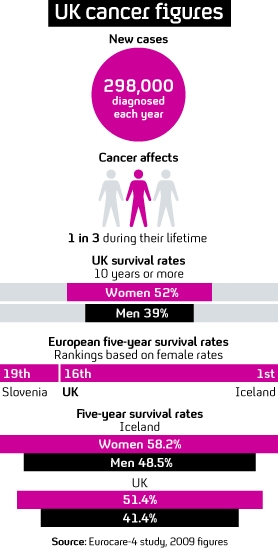£750 million cancer strategy aims to save 5,000 lives
 Victoria Macdonald
Health and Social Care Editor
Victoria Macdonald
Health and Social Care Editor
The Government has launched its new cancer strategy with a promise that it will save 5,000 lives a year. At the heart of the strategy is early diagnosis and detection, writes Victoria Macdonald.
Although much of it has been trailed over the past six months, including the new cancer drugs fund, it has been widely welcomed by cancer experts and patient groups.
At the heart of the strategy is early diagnosis and detection. General practitioners will be able to order tests currently only available through hospitals, including MRI scans for brain tumours, colonoscopies for bowel cancer or ultrasounds for ovarian cancer.
There will be an extra £750 million for the strategy – £10 million will go towards an awareness campaign, to encourage people to go to the doctor earlier if they think there is a problem. There will also be more and improved screening and a pledge to ensure that “all patients have access to the best possible treatment, care and support”.
Promises
Much of this builds on the cancer strategy developed by the Labour Government and includes the promise that patients are given an outpatient appointment within two weeks of an urgent GP referral and treatment within two weeks.
Labour today welcomed this but criticised the Government for scrapping Labour’s pledge to diagnose patients with cancer within one week, which they say could save 10,000 lives a year.

Ian Ellis, Professor of Cancer Pathology at Nottingham University, told Channel 4 News that the Government was moving in the appropriate direction. He said the most important route to improving cancer survival rates was early detection.
Public awareness
To do this, Professor Ellis said, would involve greatly improving public awareness – and that means getting people to go to the doctor, and improving screening technologies. He added that there were also issues around the early adoption of new treatments.
The Government has confirmed its commitment to the £200 million cancer fund which will provide drugs under certain circumstances and not currently approved by the National Institute for Clinical Health and Excellence (Nice).
The UK is regularly put towards the bottom when comparing cancer survival rates with other European countries. But a recent report published in the British Medical Journal said that from 1989 to 2006, breast cancer mortality decreased by at least 20 per cent in 15 European countries. But in the UK it was about 30 per cent – more than any other country in Europe except Iceland.